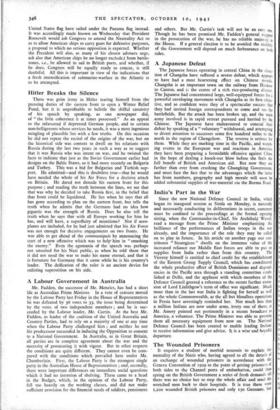A Labour Government in Australia
Mr. Fadden, the successor of Mr. Menzies, has had a short life as Australian Prime Minister. In a vote of censure moved by the Labour Party last Friday in the House of Representatives he was defeated by 36 votes to 33, the issue being determined by the votes of two independent members ; and he is suc- ceeded by the Labour leader, Mr. Curtin. At the best Mr. Fadden, as leader of the coalition of the United Australia and Country Parties, had to rely on a majority of one at any time when the Labour Party challenged him ; and neither he nor his predecessor succeeded in inducing the Opposition to consent to a National Government. In Australia, as in Great Britain, all parties are in complete agreement about the war and the necessity of prosecuting it with vigour. But in other respects the conditions are quite different. They cannot even be com- pared with the conditions which prevailed here under Mr. Chamberlain. First, the Labour Party is the strongest single party in the Australian House of Representatives ; and, secondly, there were important differences on immediate social questions which it had no intention of shelving. These came to a head in the Budget, which, in the opinion of the Labour Party, fell too heavily on the working classes, and did not make sufficient provision for the financial needs of soldiers, pensioners and others. But Mr. Curtin's task will not be an easy opt Though he has been promised Mr. Fadden's general support in the prosecution of the war, he has no reliable majority in the House. If a general election is to be avoided the stability of the Government will depend on much forbearance on both- sides.


























 Previous page
Previous page